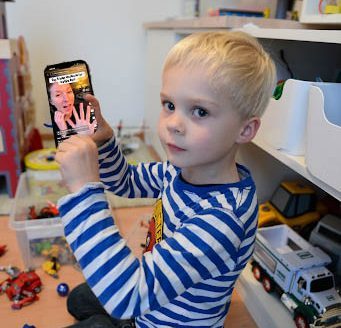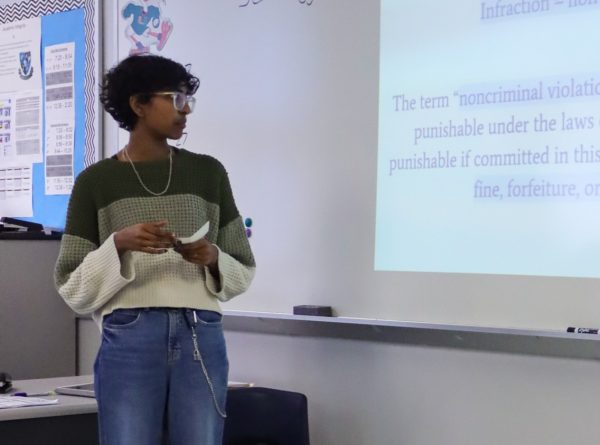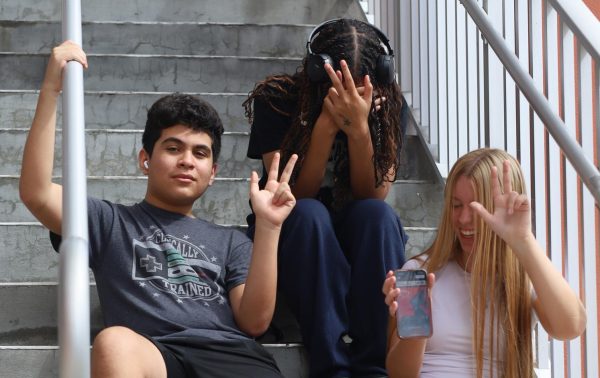Face it
Junior Abby Nicolas finds self-confidence in spite of her differences

photo by Bethany Barker
Junior Abby Nicolas turns bullying and teasing into moments for education. Nicolas has a rare birth condition, resulting in at least 14 surgeries.
Much of what we are taught through cartoons and books equates to one overarching message: looks do not matter, it’s what is on the inside that counts. Dr. Seuss’ Sneetches found peace on the beach, with or without stars on their bellies and Cindy Lou Who made friends with the Grinch. The moral of these stories are always to be confident and kind.
But when junior Abby Nicolas watched her classmates laugh at a magazine picturing children from a third world country in fourth grade, she realized that the lesson was not universal. It was not the poverty they found funny; it was the differently shaped noses and lips the subjects in the photo had. Nicolas, who shared those features, came to a realization: looks do matter.
“It was like they were making fun of what I looked like, without specifically saying it to me,” Nicolas said.
She was born with a cleft lip and a cleft palate, rare birth defects that occur when tissue does not completely join, resulting in a gap in the roof of the mouth and lip, whis is visible on the mouth and nose.
Nicolas always knew she did not fit “the stereotypical girl box,” but after the outright teasing started, it became a source of insecurity. Her self-confidence deteriorated after years of bullying throughout elementary and middle school. Nicolas’ mom, Georgie Nicolas, recalled this as a “dark path.” Having known many kids in the community since preschool, she was surprised at their behavior.
“After so many years of being bullied and tormented, being talked about, pointed out, and stuff thrown at her, it takes a toll,” Georgie said. “I thought I had a handle on it, I thought she did. I did not realize how bad it was. I never really realized how mean kids could really be.”
When her peers were not teasing her for her looks, they would comment on Nicolas’ speech impediments. Her cleft palate and lip caused her to stutter or have a lisp, which worsened when she spoke fast. To correct it, she went to speech therapy which was held at the same time as regular classes. Having to leave for “extra special classes,” in front of students who did not have to go made Nicolas feel like she was behind academically, though the lessons were mostly practicing speed reading drills and reciting tongue twisters.
“I would always feel bad about myself; I felt like I was really dumb and that I could not comprehend much,” Nicolas said.
Dr. Travis Weeks, an orthodontist and facial orthopedist at Weeks Orthodontics, notes that the cause for many speech impediments with cleft lip and palate patients is a deformed arch in the mouth, which makes it difficult for the tongue to form sounds.
His experiences with cleft palate and lip patients have led to further communication with other doctors and specialists, who all must work together to help one patient.
“I work not just within my profession, but I have to coordinate with other practitioners so that they can also do their job to the best of their ability,” Weeks said. “I am a foundation layer, and others build upon specific areas.”
She struggled with staying positive in the face of snide comments and gossip at school, but at home, the problems continued. In the beginning, without much knowledge of a cleft lip and palate, her problems with self-esteem especially affected her relationship with her mom.
“I really would cry a lot because I was really different and I just did not know how to cope with that,” Nicolas said. “When I was younger, I used to blame my mom [and] she knew. I used to think that it was something she gave me, but it is something out of the blue.”
Georgie dealt with a lot of guilt and worry for Nicolas while raising her, as she was both new to motherhood and had little idea what a cleft palate and cleft lip would entail.
“We had all the ultrasounds and nothing came up. I had never heard of it or dealt with it,” Georgie said. “I was kind of like ‘Where do we go from here? How do we fix this? What is the best way of life we can give her?’”
For both, their increased involvement with their church within the past year has changed their lives monumentally. Nicolas credits Christianity as the reason for her increase in confidence and her ability to “brush off” anything that comes up.
“One quote that I really love is ‘God did not give you anything you cannot handle.’ I really took that as a message,” Nicolas said. “I am stronger than I think I am and I can get over this.”
Her faith also helped her throughout the endless procedures she has undergone throughout her life. So far, she has had 14 surgeries. With the first one at one month old to close the gap in her lip.
Having been through it many times, Nicolas and Georgie find the entire process “routine” at this point; Nicolas has a designated “surgery outfit,” she limits eating past midnight and knows she has to be careful brushing her teeth the night before. Even so, Georgie always laughs at Nicolas’ reaction to anesthesia, no matter how many times she has seen it.
“She gets real sassy; it is really funny. She tells the doctor, ‘Let’s go, we are not moving fast enough!’” Georgie said.
This is not to say that the surgeries are easy. One of the most taxing surgeries for Nicolas was in fifth grade, when she received a bone graft. Officially called an alveolar bone graft, a piece of bone from Nicolas’ hip was taken and put in the gap between the mouth and the nose, so permanent teeth can develop. She took the whole summer to recover and “get the strength to walk again.”
“They took half of my right hip and put it into my palate to replace the hole. That was really painful and it took a long time,” Nicolas said.
Cleft palate patients are usually treated through plastic surgery. While this type of surgery is stigmatized as something vain and expensive, Nicolas has kept her health as her number one priority.
Dr. John Obi, a Jacksonville-based plastic surgeon, explains that there are two main types of surgery in his field: reconstructive and cosmetic. Obi feels that most cleft lip and palate patients’ treatment is reconstructive, as they are needed for function.
“There is no question that what we do is functional. The primary purpose is functional; they are to restore children’s ability to breathe, eat and speak properly,” Obi said.
This past June, Nicolas recovered from both a rhinoplasty procedure and a lip revision. A rhinoplasty, which is alterations made to the nose, was required for Nicolas to be able to breathe through her nose. Before, she could not.
Still, Nicolas is proud of her transformation regarding self-esteem. Looking back, she believes her attempts to change the shape of her nose with makeup or concealing her scar were unnecessary. Nicolas thinks her cleft palate and lip are what makes her stronger today, and without it, she would not be the same.
“I realize this is the only body I get; I have this for a reason. I started to learn that I can be confident,” Nicolas said. “I would not change it for anything.”
Your donation will support the student journalists of Hagerty High School. We are an ad-free publication, and your contribution helps us publish six issues of the BluePrint and cover our annual website hosting costs. Thank you so much!












